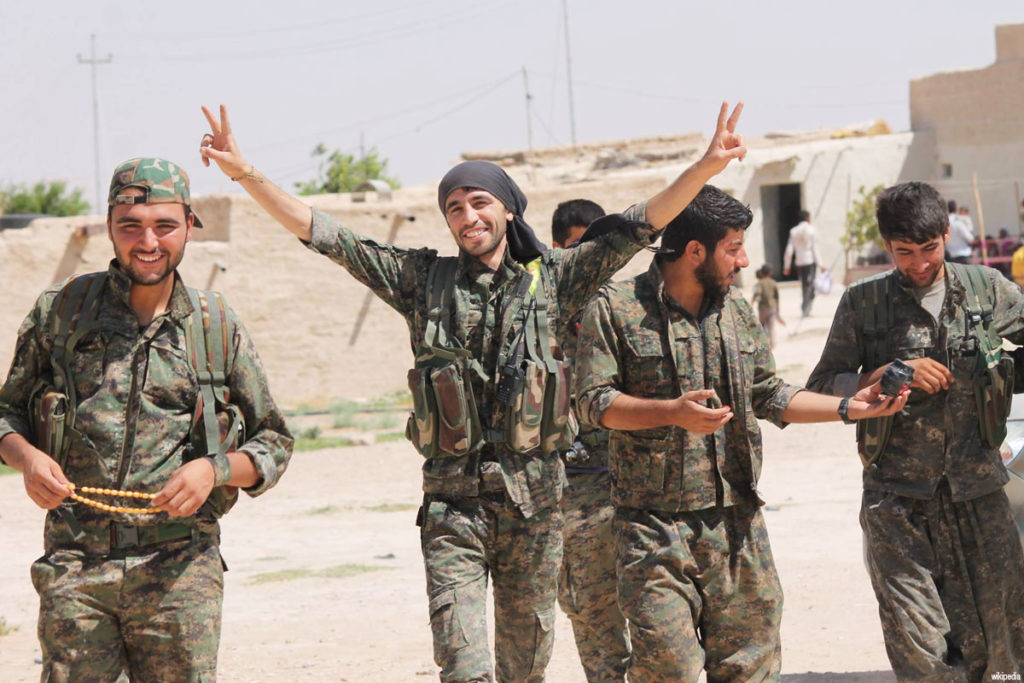
The Kurds are often hailed as the West’s most reliable partner in the fight against the Islamic State. From its victories in the border town of Kobani in Syria and in Sinjar in northern Iraq, the Kurds have taken advantage of the chaos in the region to get closer to achieving their dream of statehood.
On March 17, after the Syrian Democratic Forces (SDF)—under the umbrella of the Kurdish Democratic Union Party (PYD)—managed a streak of military victories, Kurdish leadership declared a federal region across much of northern Syria called Rojava. This in an attempt to formalize the semiautonomous zone controlled by Kurdish forces after five years of war, while falling short of complete independence from Damascus.
As a key ally in the coalition against ISIS, Syrian Kurds are in a much stronger position to bargain for their political autonomy. However this is anathema to both the Syrian and Turkish governments. The former—reinvigorated thanks to the Russian intervention—now believes that it could regain control over all of the country while the latter fears that increased Kurdish self-governance might increase tensions with its own Kurdish restive minority.
In Iraq, Masoud Barzani, president of the Iraqi Kurdistan Region, has announced his intentions of holding a referendum on independence by the end of the year—a first step toward achieving full-fledged statehood. However, some believe the referendum will be used to distract the population from more pressing problems such as the region’s flailing economy.
In February 2014, as a result of a dispute with Baghdad, the Kurdistan Regional Government (KRG) was cut off from its share of the federal budget. In June, with the emergence of ISIS, security spending skyrocketed while an influx of 2 million refugees and internally displaced persons added pressure to its infrastructure and service delivery. The final blow occurred in mid-2014 with the global drop in oil prices hitting the region particularly hard—oil revenues account for as much as 80–90% of the KRG’s budget.
In addition to these recent developments, the KRG struggles with perennial issues. In a population of 5.2 million, 1.4 million are on the government payroll Moreover the practice of “ghost-employees”—arms of the government claim more staff than they actually have to inflate their budgets—is widespread. All these factors combined create an unsustainable economic situation and threaten to stall the momentum gained against ISIS: security services are currently only paid every four months.
Looking beyond the borders of Syria and Iraq, Turkey is the most concerned about the Kurds for the reasons aforementioned. As its fight against the Kurdistan Worker’s Party—to which the PYD has close ties—in Turkey’s southeast intensifies, Ankara has bombed Kurdish fighters in Syria and allegedly tacitly helped ISIS to prevent Syrian Kurds from forming a contiguous entity along its southern border.
Turkey’s downing of a Russian fighter jet in November 2015 has put Ankara and Moscow at odds with each other. Since then, Russia has been much more inclined to support Syrian Kurds and the PYD, allowing the Rojava administration to establish its first overseas representative office in Moscow in February 2016.
Finally, the U.S. relation with the Kurds is complex: although the Kurds are reliable allies, Kurdish aspirations for autonomy complicate America’s strategic interests. Indeed, in addition to the risk of seeing the fragmentation of Iraq, American support for Syrian Kurds has increased tensions between the U.S. and Turkey—which allows the U.S. to use its military bases to conduct operations in the region.
Kurds are independent political actors whose interests are not always aligned with Washington. The coming months are essential for the future of their polity and the region as a whole.
Recommended Readings
Anne Barnard, “Syrian Kurds Hope to Establish a Federal Region in the Country’s North,” The New York Times (Mar. 16, 2016).
Zach Beauchamp, “America’s Kurdish problem: today’s allies against ISIS are tomorrow’s headache,” Vox (Apr. 8, 2016).
“Why Iraqi Kurdistan Is Struggling to Pay Its Bills,” Stratfor (Jan. 28, 2016).